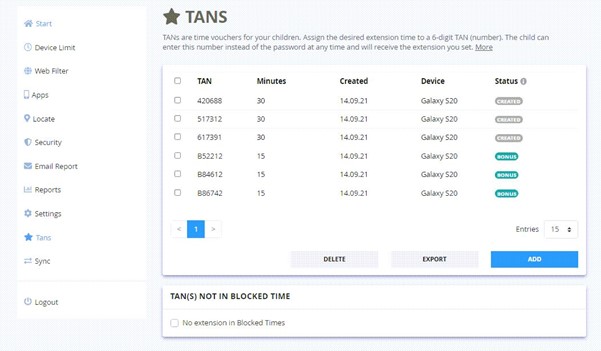Smartphones and tablets open up new opportunities for our kids to learn and be entertained. But uncontrolled access can also lead to wasted time and exposure to inappropriate content. Many parents find setting reasonable limits on technology use leads to battles and power struggles. We want our kids to benefit from technology, but also learn moderation.
Finding the right balance can be tricky…
Using parental control apps is one potential solution to consider.
These programs allow parents to restrict access and monitor activity on phones, tablets and computers.
While parental controls can help, not all are created equal.
One feature to look for is bonus apps and time vouchers.
This incentive-based system can promote healthy technology habits in kids through positive reinforcement.
Here’s a closer look at how it works:
Some parental control apps like Salfeld Child Control allow parents to reward their kids for completing chores, homework or other tasks by giving them extra device time.
This system incentivizes positive habits parents want to encourage, like exercising, reading or helping around the house.
For some software, it goes even further. Parents can select “bonus apps” which automatically generate time vouchers when used productively. For example, an educational app could provide 30 minutes of bonus time for each hour of studying.
This further motivates beneficial technology use by associating extra incentives. Parents simply enable bonus status on apps that align with family values.

Potential Benefits of Bonus Apps and Time
Used thoughtfully, time vouchers and bonus apps can:
- Set reasonable limits on entertainment while allowing kids to earn access through chores and responsibilities. Research shows parental involvement in media use reduces risky behaviors in kids.
- Motivate positive habits like studying, exercising and family contributions by associating these with reward time. Studies find rewards enhance intrinsic motivation for tasks requiring commitment.
- Promote balance and moderation in technology use. Kids learn to complete priorities first before bonus time. Excessive recreational screen time is linked to negative outcomes like sleep deprivation and obesity.
- Give kids some autonomy in choosing when to redeem voucher time, while parents maintain oversight through the app. Autonomy supportive parenting is associated with benefits like higher academic achievement.
Of course, every child and household is different. What works for one family may not for another. Some trial and error is to be expected when balancing structure and autonomy.
But overall, incentive systems aim to motivate kids intrinsically, which research shows is more effective than just restriction alone. A reward framework allows adapting based on a child’s maturity level.
There are a few important factors for parents to consider when evaluating parental control apps:
- Make sure bonus apps are positive and enriching, not “just” entertainment. Focus on quality and substance.
- Consider your child’s age and personality when structuring the system. Tailor to their developmental stage.
- Communicate and adjust the approach as needed. Don’t just set and forget parental controls.
- Use rewards and limits to teach responsibility and moderation, not just enforce arbitrary rules.
If well implemented, parental controls can support developing those vital skills kids need to thrive and find balance in the digital world. And incentive-based features like the time vouchers of Salfeld Child Control or other parental controls offer parents more flexibility in promoting technology accountability.
References:
- Padilla-Walker, L. M., Coyne, S. M., & Collier, K. M. (2016). Longitudinal relations between parental media monitoring and adolescent aggression, substance use, and risky sexual behavior. Journal of Family Communication, 16(2), 125-138.
-
Cerasoli, C. P., Nicklin, J. M., & Ford, M. T. (2014). Intrinsic motivation and extrinsic incentives jointly predict performance: A 40-year meta-analysis.
Psychological Bulletin, 140(4), 980.
- Falbe, J., Davison, K. K., Franckle, R. L., Ganter, C., Gortmaker, S. L., Smith, L., … & Taveras, E. M. (2015). Sleep duration, restfulness, and screens in the sleep environment. Pediatrics, 135(2), e367-e375.
- Joussemet, M., Landry, R., & Koestner, R. (2008). A self-determination theory perspective on parenting. Canadian Psychology/Psychologie canadienne, 49(3), 194.
-
Niemiec, C. P., & Ryan, R. M. (2009). Autonomy, competence, and relatedness in the classroom: Applying self-determination theory to educational practice.
Theory and Research in Education, 7(2), 133-144.























